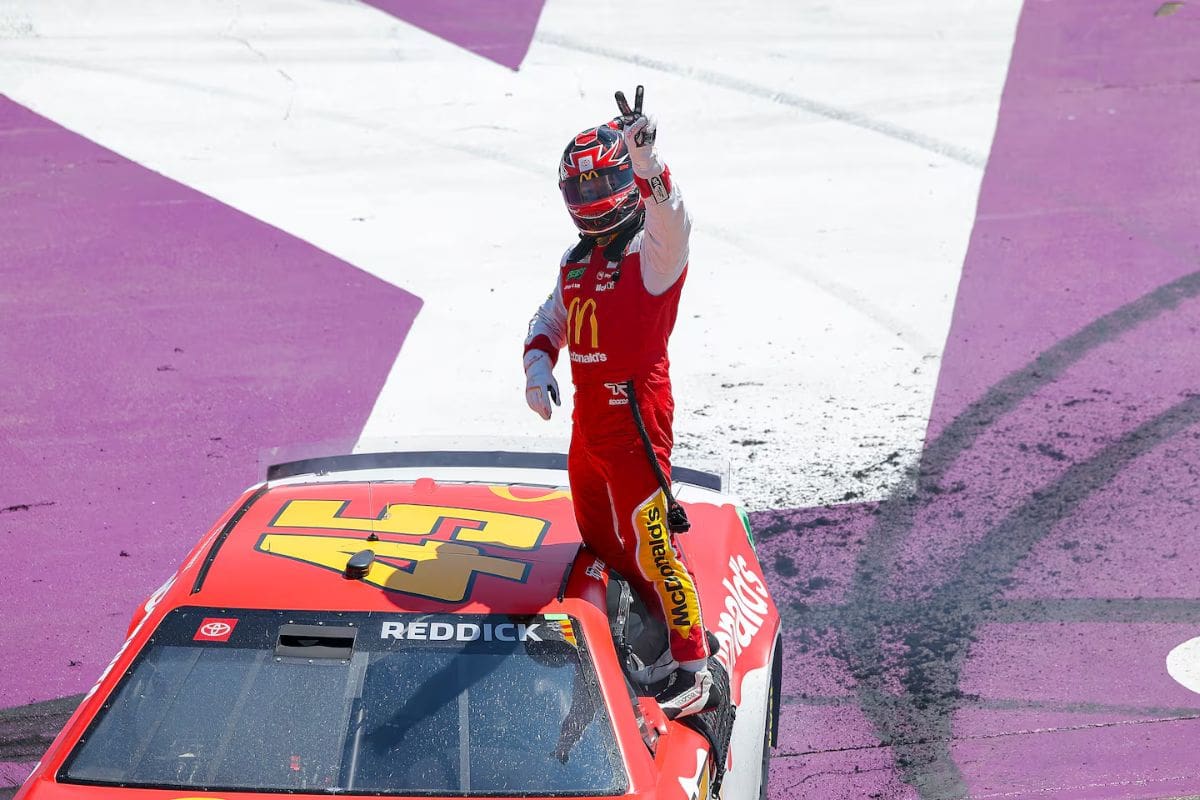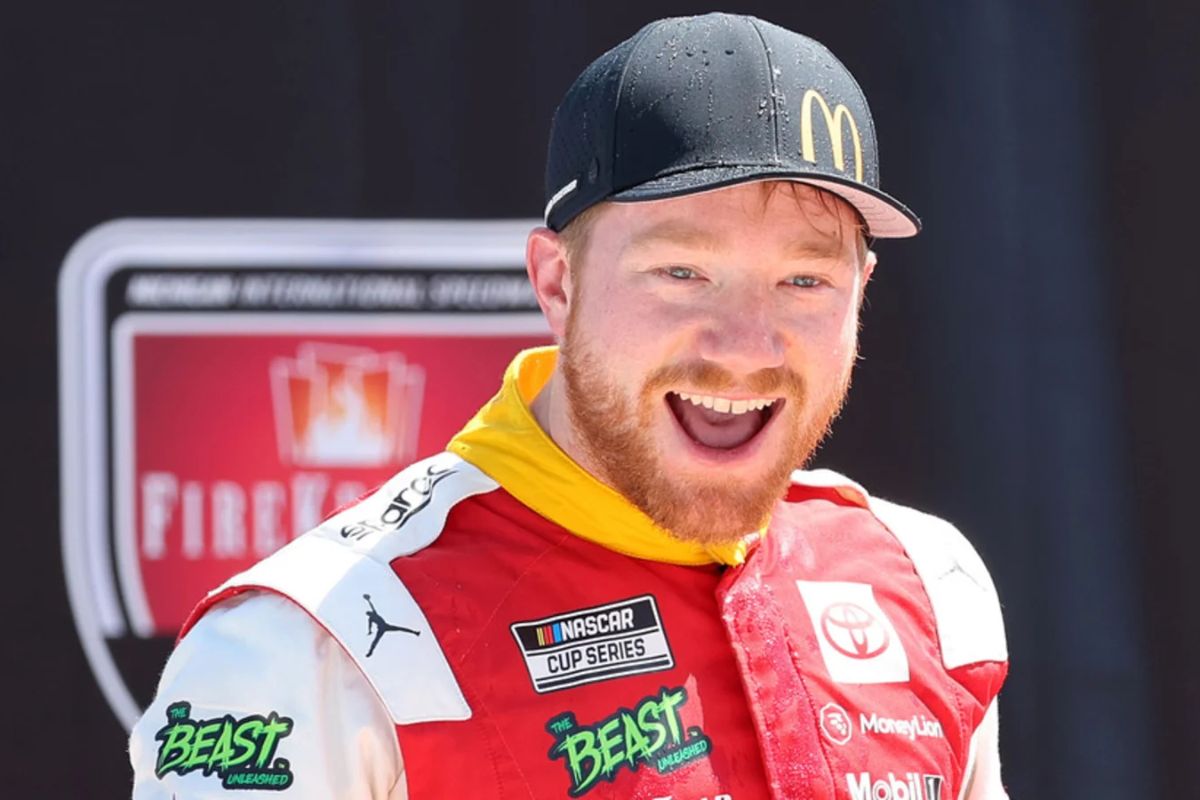Tyler Reddick’s Trophy Drama: The recent trophy presentation for Tyler Reddick‘s remarkable victory at the Southern 500 has ignited a controversy that extends beyond mere ceremony, as the conspicuous absence of NASCAR executives has raised questions about the organization’s commitment to its teams, particularly 23XI Racing. Denny Hamlin‘s expressed disappointment highlights a deeper frustration that may unravel trust and collaboration within the team. This incident not only reflects a potential rift in relationships but also hints at broader implications regarding NASCAR’s charter system and its future dynamics. What underlying issues could this event reveal about the sport’s governance and team interactions?
Key Highlights
- Tyler Reddick’s victory at the Southern 500 was overshadowed by the absence of NASCAR executives during the trophy presentation.
- The lack of recognition from NASCAR raised concerns about team morale and the importance of victories in the racing community.
- Denny Hamlin expressed disappointment over NASCAR’s oversight, indicating deeper issues within 23XI Racing and NASCAR’s relationship with teams.
- Ongoing frustrations over the charter system negotiations contribute to tensions, with teams seeking better revenue shares and operational stability.
- Curtis Polk’s resistance highlights a growing discontent among team owners regarding representation and decision-making within NASCAR’s framework.
Tyler Reddick’s Victory and Trophy Presentation Controversy
In a dramatic turn of events following Tyler Reddick‘s hard-fought victory in the Southern 500, the absence of a NASCAR executive for the trophy presentation has sparked considerable controversy within the ranks of 23XI Racing. Reddick secured the regular-season championship by a mere point over rival Kyle Larson, an achievement that should have been celebrated with the utmost fanfare.
However, the event was overshadowed by the unexpected absence of a NASCAR representative to bestow the championship trophy, a notable oversight that has raised eyebrows across the racing community.
The implications of this incident extend beyond mere disappointment; they reveal potential fissures in the relationship between NASCAR and its teams, particularly the burgeoning 23XI Racing, co-owned by the legendary Michael Jordan and veteran driver Denny Hamlin.
Such an absence during a critical moment calls into question NASCAR’s commitment to fostering a supportive environment for its drivers and teams. The symbolism of the trophy presentation is not merely ceremonial; it is a recognition of hard work, strategy, and skill.
In the context of competitive sports, the acknowledgment of achievement is essential to maintaining morale and motivation among teams and their stakeholders.
The lack of representation from NASCAR at such a vital crossroads not only undermines the importance of Reddick’s accomplishment but also potentially sows discord within a team that has already experienced its share of challenges in a highly competitive environment.
Denny Hamlin’s Frustration
Expressing his discontent openly, Denny Hamlin articulated the frustration felt within 23XI Racing regarding NASCAR’s absence during Tyler Reddick’s trophy presentation. The moment, intended to celebrate Reddick’s achievement, was overshadowed by the noticeable absence of NASCAR executives.
Hamlin did not hold back, stating, “Certainly, pretty disappointed to not see anyone from NASCAR present Tyler his trophy.” This sentiment resonates deeply, reflecting not only personal disappointment but also broader concerns within the racing community.
The snub occurs amidst rising tensions between NASCAR and race teams over the franchise system extension, adding layers to Hamlin’s frustration. The implications of this absence can be dissected into key emotional triggers:
- Recognition: The absence of NASCAR officials undermines the significance of Reddick’s victory and the hard work invested by the team.
- Unity: Such moments are essential for fostering relationships between teams and governing bodies; neglecting them can fracture trust.
- Respect: Drivers and teams deserve acknowledgement from those who govern the sport, reinforcing the shared values of competition and fellowship.
- Support: A lack of presence can signal a void of support from NASCAR during critical moments, potentially impacting team morale.
Hamlin’s straightforward remarks highlight the urgent need for NASCAR to address these relational dynamics, ensuring that the sport thrives through collaboration and mutual respect.
Disagreements Over the Charter System
The frustrations voiced by Denny Hamlin reflect broader tensions within 23XI Racing and the wider NASCAR community, particularly concerning negotiations surrounding the charter system. This system, which guarantees race entries and allocates a share of TV and purse revenue to the 36 charters in the top-level Cup Series, has become a focal point of dispute among team owners.
At the heart of the disagreement is a push from teams for a larger revenue share and the establishment of permanent charters, which would provide greater stability for their operations. Currently, the charter system is under scrutiny as NASCAR’s proposed changes, including anti-disparagement clauses and the potential repossession of charters to accommodate new manufacturers, raise concerns among existing teams.
These proposals suggest a shift in power dynamics, which could exacerbate financial disparities within the sport. The implications of these negotiations extend far beyond the boardroom, affecting team budgets, competitive balance, and the overall landscape of NASCAR.
As franchises grapple with the uncertainty and potential changes, the stakes are high. The desire for more equitable revenue sharing and the preservation of established charters highlights a fundamental struggle for survival and growth in a rapidly evolving motorsport environment.
Curtis Polk’s Resistance and Fragmented Landscape
Curtis Polk stands firmly against the proposed changes to the charter system, embodying a growing discontent among team owners regarding the future governance of NASCAR. His vocal resistance, marked by poignant actions such as donning a sign that read, “Please don’t ask me about my Charter. I don’t want to disparage NASCAR and lose it,” encapsulates the anxieties swirling within the sport.
The absence of NASCAR executives at Tyler Reddick’s trophy ceremony has only intensified these feelings, suggesting a rift that runs deeper than mere protocol.
The discontent among team owners has crystallized around several key concerns:
- Uncertainty in Governance: The proposed changes threaten to destabilize the existing charter framework, leaving teams questioning their future viability.
- Lack of Representation: The absence of NASCAR leadership at crucial events raises concerns about the value placed on team owners’ voices in decision-making processes.
- Financial Implications: A shift in the charter system could have dire financial repercussions, jeopardizing the investments made by team owners and sponsors similarly.
- Erosion of Trust: The disconnect between NASCAR and its teams fosters an environment of mistrust, potentially fracturing relationships that have been painstakingly built over decades.
Polk’s resistance reflects a larger narrative within NASCAR, where fragmented perspectives threaten to undermine the sport’s unity.
Broader Impact and Future Uncertainty
Amid growing tensions within NASCAR, the implications of the ongoing charter debate extend far beyond the boardroom, impacting the sport’s foundational structure and future growth.
The landscape of NASCAR is increasingly fragmented, with teams and NASCAR itself competing for the same sponsorship dollars, leading to a clash of interests that threatens both unity and profitability. Denny Hamlin’s remarks highlight the outdated mindset prevalent among NASCAR executives, which may be stifling innovation and growth. The insistence on a family-business mentality, rooted in tradition, fails to recognize the dynamic nature of today’s fan engagement and sponsorship opportunities.
“Right now, NASCAR owns this and teams own that, and we compete for the same sponsors, They do not want you speaking negatively. That’s a new add to the charter agreement, One side will have to wake up and be reasonable. That’s all.”
“I think for a very, very long time, NASCAR has said this is our family business and if you don’t like it, you don’t have to participate, I think the world has changed since that mentality was established a long, long time ago by Bill France Sr. and while I certainly respect everything they have built, and that they have done a good job, at a certain point, you have to update your thinking or else you will hold the sport back.” – hamlin
The withholding of image rights for promotional ventures, such as a Netflix series, exemplifies the practical consequences of this discord. Such actions inhibit not just individual team opportunities but also the broader promotional landscape that could enhance NASCAR’s profile.
“In my opinion, until we do that, we are just going to continue spinning our tires. I think it’s more just a frustration of a lack of acknowledgement that the teams have built this sport. (Rick) Hendrick and (Joe) Gibbs putting superstars on the race track – that is what has built the sport.”
“Fans do not come to see cars going around in circles. If they would, then we would sell-out ARCA races, but they don’t. They come to sellout on Sunday to watch Chase Elliott and Kyle Larson and Kyle Busch.
“There’s probably a handful of teams that are just happy to take any deal that they can get, and there’s others with some business sense that says this is unreasonable. All we do is compete against each other instead of locking arms and growing the sport together.” – hamlin
As teams grapple with the impending expiration of charters, uncertainty looms over the operational framework that underpins the sport. The potential for legal challenges and operational upheaval by 2025 emphasizes the urgency for a collaborative approach.
The prevailing sentiment among teams suggests a growing impatience with the status quo, as they recognize that competing against one another rather than harmonizing efforts will only serve to hinder NASCAR’s growth. Without a paradigm shift that accepts modern business practices and collaborative spirit, NASCAR risks stagnation in an evolving sports market, potentially alienating fans and sponsors similarly.
News in Brief: Tyler Reddick’s Trophy Drama
The absence of NASCAR executives during Tyler Reddick’s trophy presentation has showed underlying tensions within 23XI Racing and the broader NASCAR framework. Denny Hamlin’s expressed frustrations reflect a growing discontent regarding the organizational dynamics, particularly concerning the charter system and its implications for team operations. As relationships between teams and NASCAR continue to be tested, the long-term ramifications for team cohesion and competitive integrity may become increasingly pronounced, necessitating urgent dialogue and resolution within the sport.
ALSO READ: Tyler Reddick Blames Son’s Illness for Bad Race Performance Impacting Championship Run



